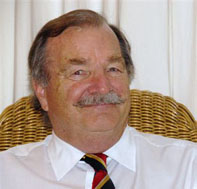In 2011 global warming caused an iceberg the size of Switzerland
to break off the Antarctic Ice Shelf and begin drifting into the
open sea. I decided to raise funds to land on it and declare it a
sovereign state.
After all, nobody owned it. And, given time, its climate will
change for the better as it drifts north into the warmer
latitudes.
Although it was born of global warming, ironically it could well
be the last nation on earth to succumb to it because it is
underlain by 543 718 886 000 tons of solid ice (approximately)
which, if multiplied by the square root of the law of thermal
dynamics, would, even on the equator, take 2 570 years
(rounded off) to melt down to the size of your average ice
cube.
I would need a few rugged and enterprising chums to help me
establish a nation. Maybe my five companions with whom I had annually cycled
in Europe in what became known as the Tours de Farce (see Blazing Bicycle Saddles)
would be suitable.
I could envisage us jumping ashore to take possession. One of us would have to say a few
important words – heroic words that would go down in history, such
as, “That’s one small step for a penguin, one helluva leap
for mankind”.
Whatever is said, it would have to be said quickly because,
knowing my friends, one of them would preempt it by
saying something like, How the hell do you keep your footing on this stuff?
Of course, before announcing the birth of our new nation, we’d have
to find it a name. This, I know, would entail a lot of argument.
“Iceland!” somebody’s bound to suggest. We’d have to tell him
that the name’s been taken.
Somebody’s then bound to say, “Well, how about Chilly?”
“How about the Republic of Iceberg?” another would cry. Or New Seal Land.
(Personally, dear reader, I’d prefer a kingdom to a
republic. I fancy myself as king – James the First – it has a ring
to it. On the other hand, what if it were a republic? Then I would be president
– the only president in the world whose presidential seal could balance a
ball on the end of its nose.
“How about Schnapps?” another might say.
“How can you call a country ‘Schnapps’?” I would say.
“No, no, I meant let’s have Schnapps to celebrate.”
Somebody would then say, “Let’s rather heat up some Glühwein!”
That’s the trouble with my friends. Here we have
the opportunity to start a country from scratch and with dignity and
provide a shining example of nationhood to a troubled world, and what would they do?
They would set up folding chairs, find some chips and dip and start
shouting “Cheers!” and “Down the hatch!”
I should never have asked them in the first place.
But just think of it – starting a new country with no pollution, no
religions, no crime, no taxes – we can make up our own laws.
I can see us now… standing there in our mukluks, claiming
sovereignty over 45 000 square kilometres of virgin territory,
knowing that wherever we drift we would have fishing rights for
200 miles around. Fishing would underpin our economy – well,
that and the export of ice blocks to countries short of freshwater.
We could develop winter sports resorts.
Our main transport in this new land would be environmentally friendly
because we would mainly be skating around on our backsides,
feet in the air.
Our towns would be built on soil-covered platforms so as not to
accelerate the melting of the ice and our currency could be
sardines. Judging by the price of fish these days, we could start off with an
exchange rate of $12.40 to the sardine.
Filed under: exploration, General, holidays, StoepTalk, Travel | Tagged: Exploration, global warming, greenhouse effect, icebergs | Leave a comment »




